
Siphonaria is a genus of air-breathing sea snails or false limpets, marine pulmonate gastropod molluscs in the family Siphonariidae, the false limpets.

Phenatoma is a genus of predatory sea snails, marine gastropod mollusks in the family Borsoniidae.
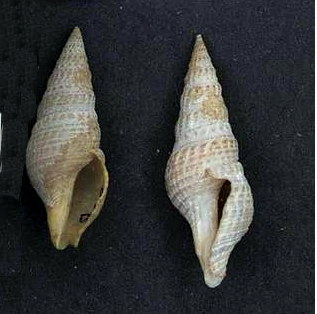
Phenatoma rosea, or the pink tower shell, is a species of predatory sea snail, a marine gastropod mollusc in the family Borsoniidae.
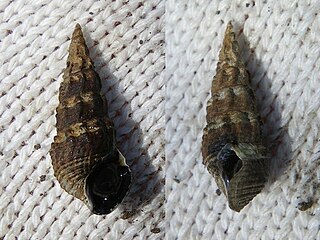
Batillaria is a genus of small salt marsh or mudflat snails, marine gastropod mollusks in the family Batillariidae, the horn snails.

Patelloida is a genus of sea snails or true limpets, marine gastropod molluscs in the family Lottiidae, one of the families of true limpets.

Lottiidae is a family of sea snails, specifically true limpets, marine gastropod mollusks in the superfamily Lottioidea and the clade Patellogastropoda.

Crepidula, commonly known as the slipper snails, slipper limpets, or slipper shells, is a genus of sea snails, marine gastropod mollusks in the family Calyptraeidae. This family includes the slipper snails (Crepidula), hat snails (Calyptraea), spiny slipper snails (Bostrycapulus), and cup-and-saucer snails (Crucibulum) as well as Crepipatella, Siphopatella, Grandicrepidula, and Maoricrypta.

Austrolittorina cincta is a species of sea snail, a marine gastropod mollusk in the family Littorinidae, the winkles or periwinkles, found in and endemic to New Zealand. Commonly called the brown periwinkle, or ngaeti in the Māori language. Although present in all parts of the country, it is more common in the south. Size up to 15mm in length.
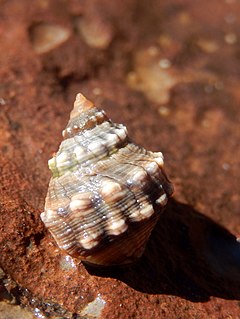
Nodilittorina pyramidalis, commonly known as a Pyramid Periwinkle, is a species of sea snail, a marine gastropod mollusk in the family Littorinidae, the winkles or periwinkles.

Cereus is a genus of sea anemones in the family Sagartiidae.

Actinia is a genus of sea anemones in the family Actiniidae. Actinia display a rare form of heteromorphosis in which a cut inflicted on a specimen can develop into a second mouth.

Sagartia is a genus of sea anemones in the family Sagartiidae. The genus was first described by Philip Henry Gosse in 1855 and the image is his painting of several species found in British waters included in his book, A history of the British sea-anemones and corals.
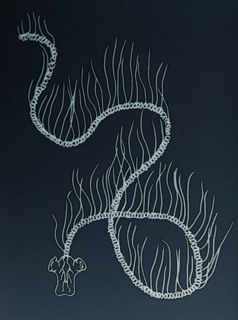
Prayidae is a family of marine invertebrates in the order Siphonophora. They are colonial, and the colonies can superficially resemble jellyfish; although they appear to be a single organism, each specimen is actually a colony of Siphonophora.

The Abylidae are a family of marine invertebrates in the order Siphonophora. They are colonial, but the colonies can superficially resemble jellyfish; although they appear to be a single organism, each specimen is actually a colony of Siphonophora.
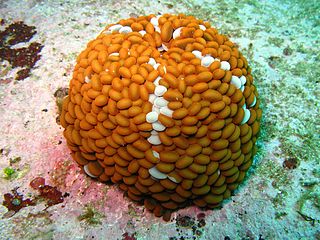
Phlyctenactis tuberculosa, common name the wandering sea anemone or swimming anemone, is a species of sea anemone in the family Actiniidae. It is native to shallow seas around Australia and New Zealand. It was first described by the French zoologist Jean René Constant Quoy and the French naturalist Joseph Paul Gaimard. They were naval surgeons serving in the French Navy and made extensive collections of organisms they came across in their travels.

Actinodendron arboreum, commonly known as tree anemone or hell's fire anemone, is a species of sea anemone in the family Actinodendronidae. It is native to the Indo-Pacific where it grows at depths of down to 28 metres (92 ft). Most sea anemone species are harmless to humans, but A. arboreum is highly venomous and its sting can cause severe skin ulcers.

Leucotheidae is a family of ctenophores. It contains a single genus, Leucothea.
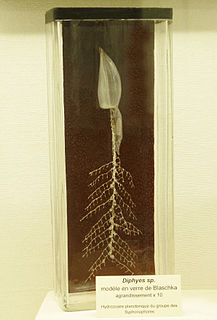
The Diphyidae are a family of siphonophores. These are colonial siphonophores with two nectophores arranged one behind the other. The front one includes a somatocyst, while the hind one does not. The somatocyst often contains an oil droplet for buoyancy control. A nectosac in each nectophore allows the organism to swim efficiently.

Tubipora is a genus of soft coral. It is the only genus within the monotypic family Tubiporidae.
Corolla ovata is a species of gastropod in the family Cymbuliidae.




















